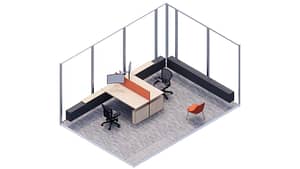To Hotel or Not to Hotel
By John Hopkins, Design Director
& Cara Rooney-Fields, Senior Designer
To hotel or not to hotel? That is the question currently confronting many law firms. Why? The answer lies in the increasing acceptance and appreciation of the hybrid work model by lawyers and their colleagues. This now commonplace approach has impacted the work process, questioned hierarchy, challenged retention and recruitment, and affected the amount of space law firms require.
Traditionally, 50% to 70% of law office square footage is dedicated to single-person offices that are now often empty. With all these factors in mind, many law firms are cautiously eyeing hoteling, although unsure of its possibilities and viability for their organization. How might it work?

The Private Office
To begin, consider some of the reasons for not making the change. How important to the firm’s culture is the physical hierarchy defined by the allocation of space? Does space type equal status? In some cases, the answer is yes. A partner at a Miami law firm shared with us the importance of her large office. Because of the local culture and the fact that she is female, the size of her office signals her role as a leader to colleagues and visitors. As another example, a private office for associates as the physical embodiment of achievement can be a positive contributor to the challenge of recruitment and retention.
Private offices offer other advantages. A generous-sized partner’s office provides the space to mentor a group of associates or accommodate collaboration. With the right technology, that office can act as a mini-hub, a place for team and client meetings, as well as heads-down work and one-on-one mentoring sessions.


Why Introduce Hoteling?
Although multiple issues and considerations have to be evaluated, weighed, and discussed, imagine this scenario. The firm has leased a 50,000-square-foot suite to accommodate approximately 100 lawyers, but now only 25 to 30 are in the office on a typical day. The space feels empty; colleagues sit amid vacant offices. The absence of coworkers creates an energy vacuum and a sense of isolation. Maybe it would have been best to say at home.
On the other hand, a rightsized office that features hoteling and provides sight lines to colleagues, inspiring interaction and opportunities to learn from one another, can be a reason to come to the office. The space is energized. Colleagues can see one another in a shared environment as opposed to a workspace with mostly empty offices. And the benefits of casual collision can be realized, often eliminating the need to book a Zoom call for a quick chat with a colleague.

What are IA’s legal clients doing?
It depends, and we see regional differences. For instance, at some firms, hoteling is an incentive for retention/recruitment. One client in New York City will hotel to keep abreast of its competitors that have already moved to hoteling. However, firms in Midwest locations are hoteling less, if at all. On the West Coast hybrid work and the creation of new space types attuned to that model are deemed forward-looking and desirable. Since tech firms dominate the region, law firms there have understood hoteling for several years.
An Abundance of Space-types for Hoteling
There are many options for law office customization (see examples below). One possibility is a private office for some and hoteling for others. For example, paralegals and associates might hotel with offices assigned for partners. How about cohabitating? A partner and one to three associates could share a large office where opportunities for mentoring and collaboration would be ongoing. And what if junior associates sat in workstation clusters to support each other yet were close to partners for easy collaboration?
Hoteling could offer a menu of office sizes and configurations, each furnished a bit differently to best support a specific work scenario, lawyers choosing the right setting for the task at hand. Teaming might be the focus today, with heads-down work planned for tomorrow. Lawyers would work in a choice-based landscape.





Active Support
To support the practicalities of hoteling, some firms are considering ways to provide concierge services. Imagine booking a room for a week or more. Before arrival, concierge support brings in your needed belongings as well as required files from storage, sets up your personal items, hangs your credentials on the wall, and positions your nameplate in the hall by the door.
As another advantage, room-scheduling software could allow practice groups to sit near each other and know who is in the office. There are multiple ways to support lawyers and alleviate some of the basic concerns around giving up a private office.

Final Thoughts
In general, hoteling requires a change in approach to the workplace and a new mindset around me versus we. Shared individual space usage will free up space to create more venues for interaction and casual collision, including work lounges, collaboration areas, or even a hub/café for refreshment, relaxation, and comradery.
For some law firms, hoteling will benefit the work environment as a scheme that complements new ways of working with right-sized square footage—the savings generated an added value. As a component of a law office customized for firm culture that enables individual and collaborative work while offering inviting amenities, hoteling can inspire attendance and ensure a commute-worthy experience.

John Hopkins, AIA, LEED AP
Design Director | Chicago

